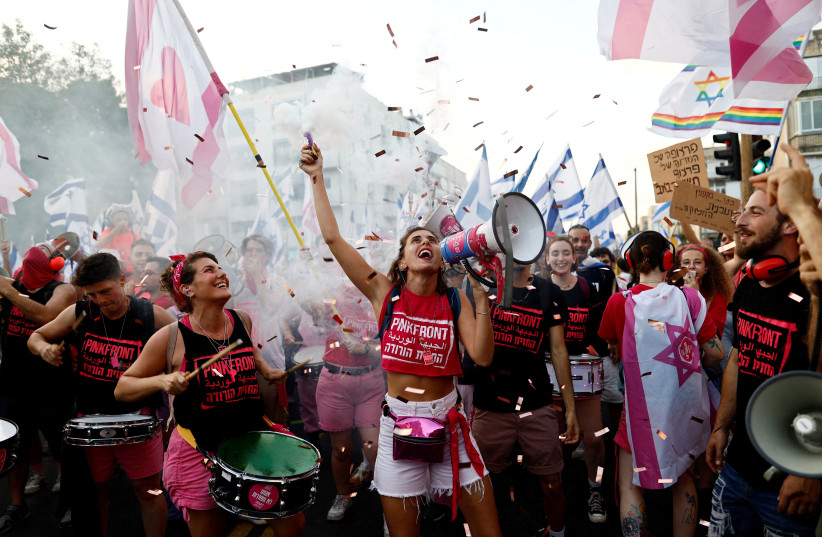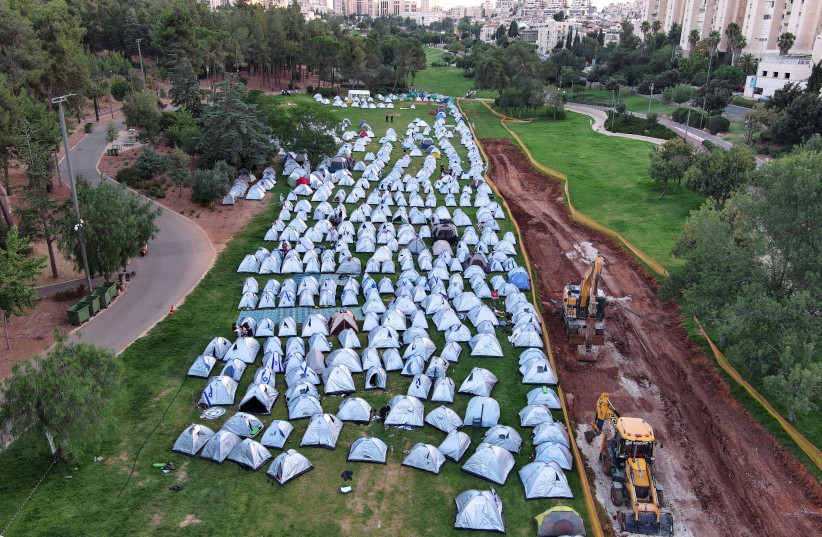The protests against the government’s judicial reform have been confusing from the beginning, with several complicated legal provisions at the crux of the debate. But even more perplexing and troubling for some is how ancillary issues, such as women’s rights or peace activism, are connected to the reform and lead to other controversial demonstrations, including the one at the Chief Rabbinate building in Tel Aviv last Tuesday.
Or on Saturday night, protesters hung a sign from a bridge in Tel Aviv declaring, “We don’t kill and we won’t die in service of the settlements.”
Religious Israelis rightly expressed concern that they are under attack, as those living beyond the Green Line feel targeted by such signs.
There is nothing in the current reform proposals that explicitly addresses disputed territory or settlements, and critics of the protest movements argue that such displays show that the protests are not just about the coalition’s policies to change the legal system but are a political challenge to the existence of the current coalition.
Coalition MKs have argued that the opposition was angered that it lost the election; the losing factions have been trying to unseat the government ever since, and fostering judicial reform protests is just a means to that end.

That all of the opposition is against the reform and all of the coalition supports the reform indicates that there is at least some realpolitik at play.
Many in the anti-reform camp genuinely seem to see the provisions of the judicial reform as inextricably connected to their championed causes.
Building an Alternative women's right activists spoke with Jerusalem Post
The entire reform would ruin the system of checks and balances provided by an independent judiciary, and the result would be a tyranny of the majority, activists from the women’s rights group Building an Alternative told The Jerusalem Post at protests in Jerusalem’s Sacher Park on Sunday. In that scenario, minorities ultimately suffer, particularly women’s rights advocates, they said.
One activist took the thought thread even further and said: “Women are the largest minority, but this could harm [members of] the Arab sector, who are the most economically and socially vulnerable.”
The reasonableness standard bill debated in the Knesset plenum on Sunday was just the beginning, they said, for if passed, it would remove the requirement for reasonable government actions and allow capricious and arbitrary actions that would impact individual rights.
The protest against the rabbinate was about the legal status of women and marriage, they said, which falls under their concerns about reform of the legal system.
“We’re not against reform; we’re against this reform,” said one women’s rights activist.
Yet there are many interests pursued by the group and others that do seem beyond the scope of what can be impacted by the judicial reform, even through secondary effects.
“The government from its first day in power hasn’t dealt with the major issues,” one activist said.
A misappropriated budget, lack of funds and manpower for workers with children with disabilities, an overworked medical staff, a troubled education system, and fears that religious dictates may be forced on secular people may be genuine issues and worthy of redress, but it is debatable whether it is necessary or desirable to lump them in with all the judicial reform controversies.

The activists did say their goal wasn’t to interfere with the government, but rather to advocate on behalf of everyone. But when the reform acts as a trigger for all the other aspects of the government’s agenda, it’s difficult to address the actual reform debate.
Part of the confusion comes from the chaotic nature of the protests. Demonstrators at Sacher Park seemed to be part of multiple organizations at once, and they brought their own signs, T-shirts, and people – and undoubtedly their own agendas as well.
While Israeli flags are always dominant, anti-settlers signs, Palestinian flags and other political messages will inevitably be found in the massive crowds if everyone is accepted under the loose coalition of NGOs and protest groups.
Some groups may be trying to use the reform to promote their special interests, or they may be pushing them as a secondary objective. But based on anecdotal conversations with different activists on Sunday, it’s likely that many can’t help but unintentionally or subconsciously tangle their thoughts and feelings on different issues together.
It is no wonder that rhetoric is so heated about judicial reform when everything is all bound together in one package of political concerns. Consequently, the specific judicial reform issues can’t be differentiated from general misgivings about Prime Minister Binyamin Netanyahu’s coalition agenda.
Reactions to the controversial bridge sign in Tel Aviv, however, show that accident or intentional, lumping political sentiments together creates polarization.
Rather than just deal with a contentious debate about proper governance, we are creating a war of all political agendas versus all political agendas, in which everything is on the table at once with the highest stakes possible. Much-needed debates about the relationships between government branches become a conflict of secular versus religious, center vs settlements, and Left vs Right – despite both sides insisting otherwise. With such stakes, it becomes difficult to de-escalate.
The judicial reform is confusing enough as it is, and if Israelis want to be able to address the issues with the legal system, they need to be able to disentangle all their other political problems and address them separately – no matter how noble they might believe them to be. Otherwise, issues that might be negotiated on will remain unsolvable.
